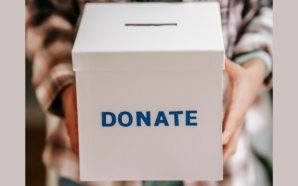Reflections from the Southern Border
A truck comes to empty the porta potty right before Mass. This is to say Mass often doesn’t begin until the truck has left, since the porta potties stand right behind the pews and the pews need to be moved for the truck to go in and out. And also the pews are the benches where people sit to eat their meals and the altar is one of the folding tables upon which they eat.
And so, while the general instructions for a Catholic Mass say that pews and altars should be stationary and immovable, that isn’t going to work here. Those general instructions don’t say anything about where the porta potties should go, or about their smell. They assume an amount of stability, a certain non-portability. That is fine. It is ideal in many ways.
But it is not reality for migrants whose lives are by nature unstable, in movement, non-stationary, but portable. Nor is it reality for those who accompany them.
I spent a good portion of this summer accompanying migrants, and those who accompany them, along the U.S.-Mexico Border, the most traveled border in the world. I was with my brother Jesuits who live in Brownsville, TX and work with Del Camino Jesuit Border Ministries.
In an article for America Magazine, another Jesuit and I wrote about witnessing the legally dubious ways the U.S. government is targeting people for deportation and fast tracking their removal, bypassing due process. We witnessed a man named Carlos go through a court hearing that seemed to be going in his favor, only to be bamboozled out of his scheduled future hearings in the last couple minutes and then detained by ICE outside the court house. My friend Fr. Brian Strassburger was interviewed further about it by PBS Newshour.
But alongside the broken policies, issues of border crossing, lack of due process, and the tactics of ICE, those porta potties and the smell of them being emptied right before Mass are stuck in my mind.
The main aim of Del Camino Jesuit Border Ministries is not advocacy, case management, or humanitarian aid, though it engages significantly in all of these. Rather, the main aim is spiritual and sacramental accompaniment of migrants. This means that the primary work is to visit migrant shelters and celebrate Mass and other sacraments with the migrants who live there.
The skeptic in me initially questioned this. Is this really what these people need most? Mass? Even though I am a Jesuit in formation to be a priest, this question still rises up in me. Isn’t the more important thing to meet their material needs, advocate for a change in the system, etc. etc.
It is a silly question, really, even though it might seem reasonable at first. It is laughable to think about actually posing this question to so many of the people I met this summer, “Don’t you want us to do something instead of Mass?”
Of course, this sets up a false binary. Both spiritual and material care are needed and the Jesuits on the border are engaged heavily in both of these aspects of care and advocacy.
But what questioning the priority of spiritual and sacramental care for these migrants ironically echoed was one of the loudest assaults on their character from both Donald Trump and many of his supporters. It belies that the people trying to migrate to this country and those who already have, are not criminals, not awful, scary people, but are individuals with heartaches and prayer lives and children who they want baptized, people with desires to be connected to ancient traditions, to pray to God.
I’ve never been to a First Communion where you can see dumpsters, tents, and porta potties at the same time as young girls in white dresses partake of the Body of Christ. It’s dehumanizing, really, and I don’t mean to romanticize the tragedy of the situation. These families should not have to celebrate their first sacraments with the wafts of a porta potty and the sight of a dumpster.
But the thing is that they do. They do celebrate them, even in this situation, in these surroundings. And they do so with a joy that is rare even in the most beautiful of churches.
One Sunday, I watched a 13 year-old girl emerge from the rows of tents where families lived wearing a beautiful long white dress, her hair made up and smiling from ear to ear. It was the day of her Baptism. She walked to the area where we would be having Mass, the shelter community excitedly greeting her on her big day.
The juxtaposition was striking: such beauty so close to so much tragedy. The beauty was the young girl’s desire for baptism, the community’s love and support for her, the priests who have faithfully accompanied her and her family. The tragedy was that they were living in tents, that they were so far from home, that in a few weeks they were having to return home after a truly awful and violent journey, all hopes having been dashed of entering the United States where they sought relief and a better life.
During so many of these Masses, in sweltering heat, amid foul smells, in folding chairs and tables, and under the sound of loud traffic bustling past the makeshift shelter, people joyfully celebrated the mysteries of faith. Families brought their sleeping babies, kids brought their energy, they ran around and fought over ringing the bells at the Consecration. Many of them took pride in altar serving, not in white robes with folded hands, but with faith and reverence manifested only as pure joy.
There is a risk in the moment we are living in of turning migrants into political pawns. Whereas the right has brandished migrants as evil, making them a pawn in a larger project of nationalism, the left can so easily use them as a talking point for their own axes to grind against Donald Trump. They become a means to a larger end. This is tragic because it covers over the complex, beautiful lives that these people carry with them as they migrate, as they wait, and as they pray. It erases their humanity.
James Baldwin said that “American history is longer, larger, more various, more beautiful, and more terrible than anything anyone has ever said about it.” I have found that this insight proves to be true time after time. And I saw it again at the border this summer.
What is taking place in the campaign against migrants is truly awful, more terrible than many of us know. And at the same time, the resilience, the faith, the beauty of the lives of people and the tenacity of those trying to accompany them is more beautiful than we feel we have time to honor.
But the beauty can’t be lost. As an elder said to me this summer on her 94th birthday, “all we have is beauty.”
If you are looking for some ways to respond to the current attack on migrants, I encourage you to follow the work of Del Camino Border ministries. You can sign up for their newsletter and find their Amazon wishlist here. And here is a link to a fundraiser for a friend of theirs who has been stuck in detention in Michigan, wrongfully being accused of gang membership because of tattoos. He is a former seminarian who organized and led prayer groups at the migrant shelters with Del Camino. He is not a criminal nor a member of a gang.
Billy Critchley-Menor SJ is a Jesuit in formation to be a Catholic priest. Currently, he studies Theology at Boston College, and before that, he was a teacher of theology and literature in Pine Ridge, South Dakota.
This article was originally published on Billy’s Substack page. Reproduced with permission.








